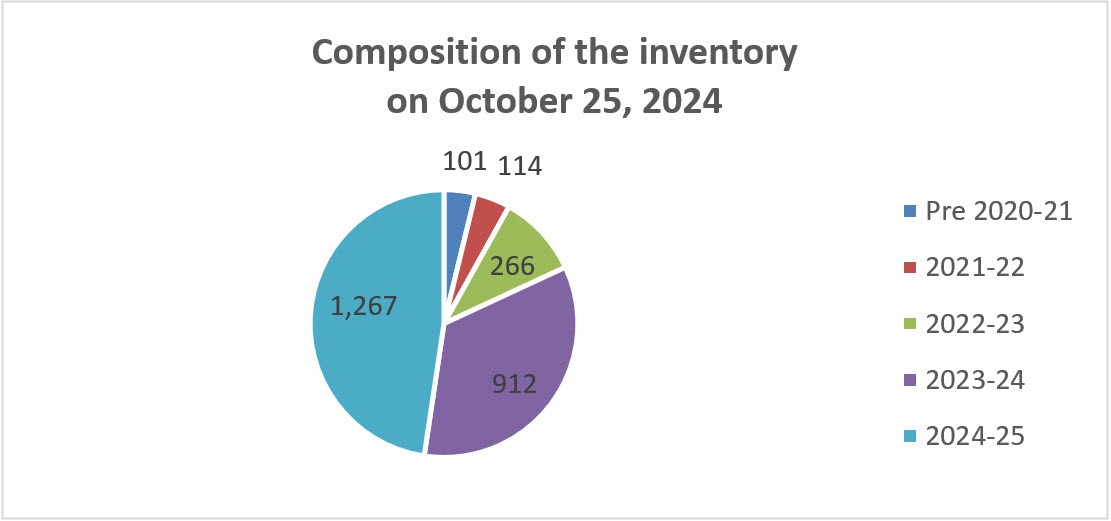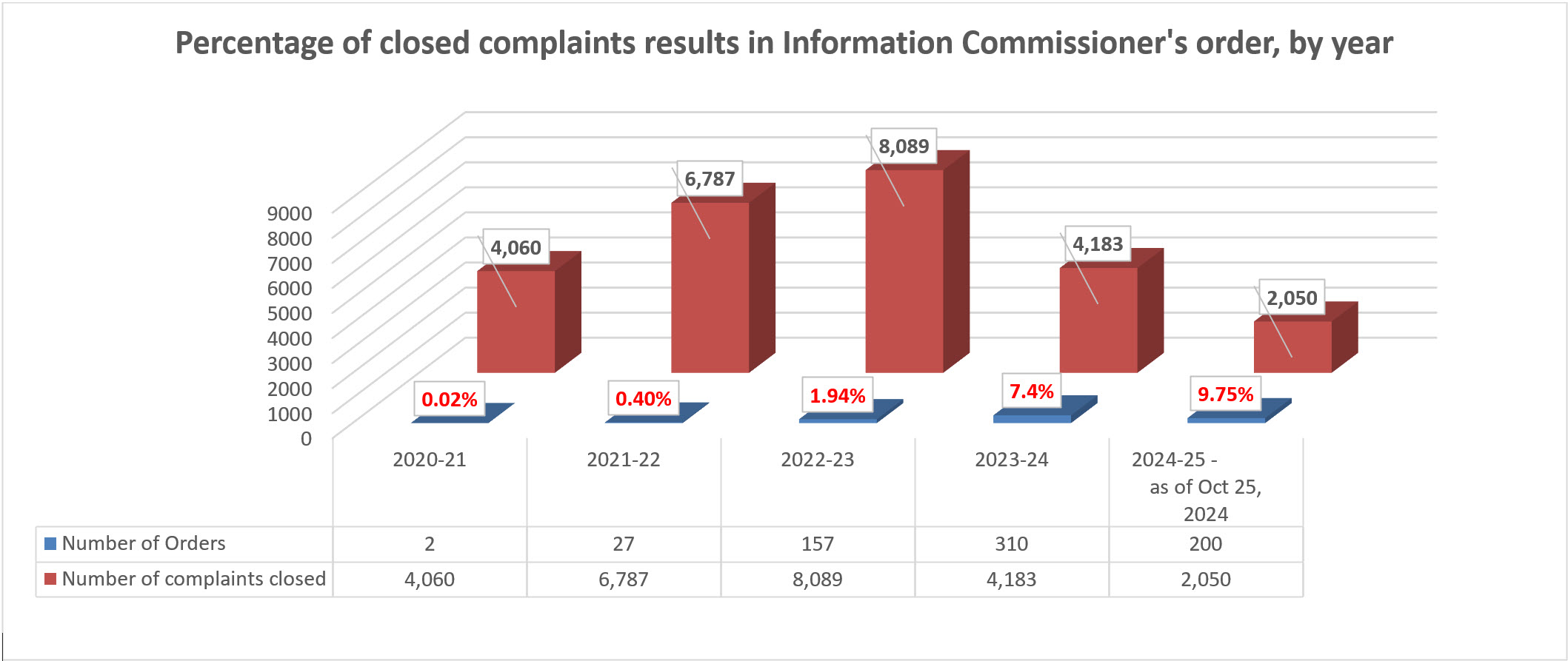Mandate Snapshot as of October 25, 2024
Reducing the inventory of complaints amid record influx
- When she was appointed in March 2018, Commissioner Maynard’s first priority was to address the inventory of complaints she inherited, while continuing to investigate new complaints. She inherited more than 3,500 open complaints, some of which had been in the inventory for more than 10 years.
- During her mandate, she essentially eliminated the inventory she had inherited while dealing with a record number of new registered complaints, totalling more than 32,000 complaints since March 2018.
- By the end of the current fiscal year, the Office of the Information Commissioner’s (OIC) inventory will overwhelmingly consist of complaints under investigation or recently submitted complaints awaiting investigation.

Details
| Inventory on October 25, 2024 | Total complaints registered 2018-2024 | Complaints registered by fiscal year | Inventory on March 1, 2018 | |
|---|---|---|---|---|
| 2018 | 2660 | 32482 | 2467 | 3579 |
| 2019 | 6173 | |||
| 2020 | 4068 | |||
| 2021 | 6945 | |||
| 2022 | 7407 | |||
| 2023 | 4183 | |||
| 2024 | 2037 |

Details
| Inventory FY 2024-2025 (As of 25 Oct, 2024) | |
|---|---|
| Pre 2020-21 | 101 |
| 2021-22 | 114 |
| 2022-23 | 266 |
| 2023-24 | 912 |
| 2024-25 | 1267 |
Ensuring complainants receive the information they are entitled to
- During Commissioner Maynard’s mandate, more than 35,000 complaints were closed.
- Her office has managed to close 8% more complaints than were registered.
- She undertook six systemic investigations when she wanted to shed light on a broad issue that requires a multifaceted analysis or when an institution was not responsive to individual investigations. One systemic investigation into ArriveCAN is ongoing.
- The Commissioner has invested resources into systemic investigations as she believes they pay dividends in terms of getting at the root cause of chronic issues that plague the federal access system.
- The recommendations from these investigations have been implemented by the institution involved and by others facing similar challenges.
Implementing reforms to the Access to Information Act
- The Commissioner’s second priority was to prepare for the implementation of Bill C-58, the first bill to significantly amend and update the federal Access to Information Act since it first became law in 1983.
- When the legislative amendments came into force in June 2019, the Information Commissioner was granted order-making powers. To date, Commissioner Maynard has made nearly 700 orders.

Details
| Number of Orders | Number of complaints closed | |
|---|---|---|
| 2020-21 | 2 | 4060 |
| 2021-22 | 27 | 6786 |
| 2022-23 | 157 | 8089 |
| 2023-24 | 310 | 4183 |
| 2024-25 - as of Oct 25, 2024 | 200 | 2050 |
- Five years after the changes to the Act, the Federal Court is hearing matters involving her orders and rendering more decisions on these matters.
- She has launched legal proceedings against institutions that have chosen to ignore her orders. To date, she has initiated 6 applications for an order of mandamus before the Court to compel compliance with her orders.
- A new provision of the Act also allows institutions to refuse to act on an access request if, in the opinion of the head of the institution, the request is vexatious, made in bad faith or otherwise an abuse of the right to make a request for access to records.
- To date, 76 applications were received from institutions seeking the Commissioner’s approval to decline to act on an access request; 12 applications have been granted.
Ensuring that the day-to-day work is open and transparent
- The Commissioner’s third priority was to provide clear guidance on her interpretation of the Act and the approach of her office when conducting investigations, to ensure both complainants and institutions easily understand her position.
- To do this, the OIC completely redesigned its website and began regularly publishing updated guidance. Complainants can now better understand the possible outcomes of their complaints by consulting the OIC’s website.
- Since the amendments to the Act, the Information Commissioner can also publish final reports setting out the results of her investigations and outlining the reasons and principles behind her decisions. To enable users to search these reports as well as other decisions, including orders, the OIC has established a searchable decisions database. To date, 224 final reports and 602 orders have been published.
Collaborating with parliamentarians, complainants, institutions and other stakeholders
- The Commissioner’s fourth and final priority was to work with parliamentarians, complainants and other stakeholders to address barriers in the system as well as with government institutions to help them meet their obligations under the Act.
- Since the beginning of her mandate, Commissioner Maynard has conducted more than 140 meetings and presentations to parliamentarians, senior management, ministers and public servants of various government institutions, including semi-annual meetings with members of the Access to Information and Privacy (ATIP) community.
- To assess the effectiveness of the Investigations Program processes in achieving its intended results, she commissioned an independent evaluation from the perspective of institutions. A separate consultation with complainants was carried out to better understand their views and respond to their specific needs.
- In January 2021, she made several recommendations for further changes to the legislation in the context of the Government’s review of the access to information regime. Since then, she has repeatedly advocated for the necessity to modernize the Act, including the need for an independent funding mechanism to ensure that her office is efficiently and properly funded.
- She appeared over 20 times in front of seven parliamentary committees, providing information on her operations and advice to parliamentarians in the context of various studies, including the Standing Committee on Access to Information, Privacy and Ethics’ study on the state of Canada’s access to information system.
- As part of her Access at Issue series, she tabled five special reports to Parliament, presenting findings and recommendations from her systemic investigations and drawing Parliament’s attention to broader challenges facing the access system.
- She is active at the federal-provincial-territorial (FPT) level, notably as chair of the Annual FPT Investigators Conference, which she helped to establish, and on the international scene, including as a member of the International Conference of Information Commissioners (ICIC).